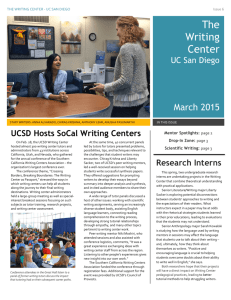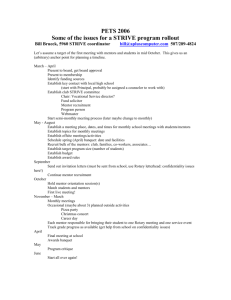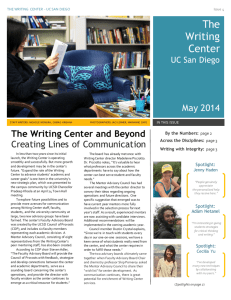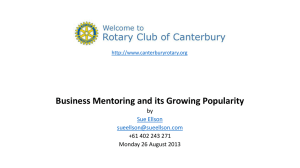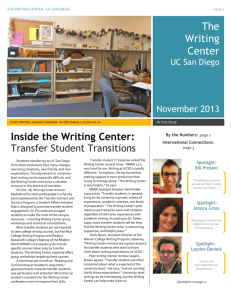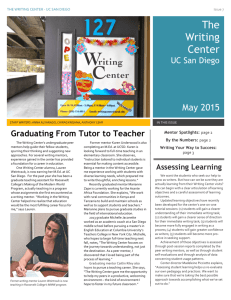May 2013 - the Writing Center!
advertisement
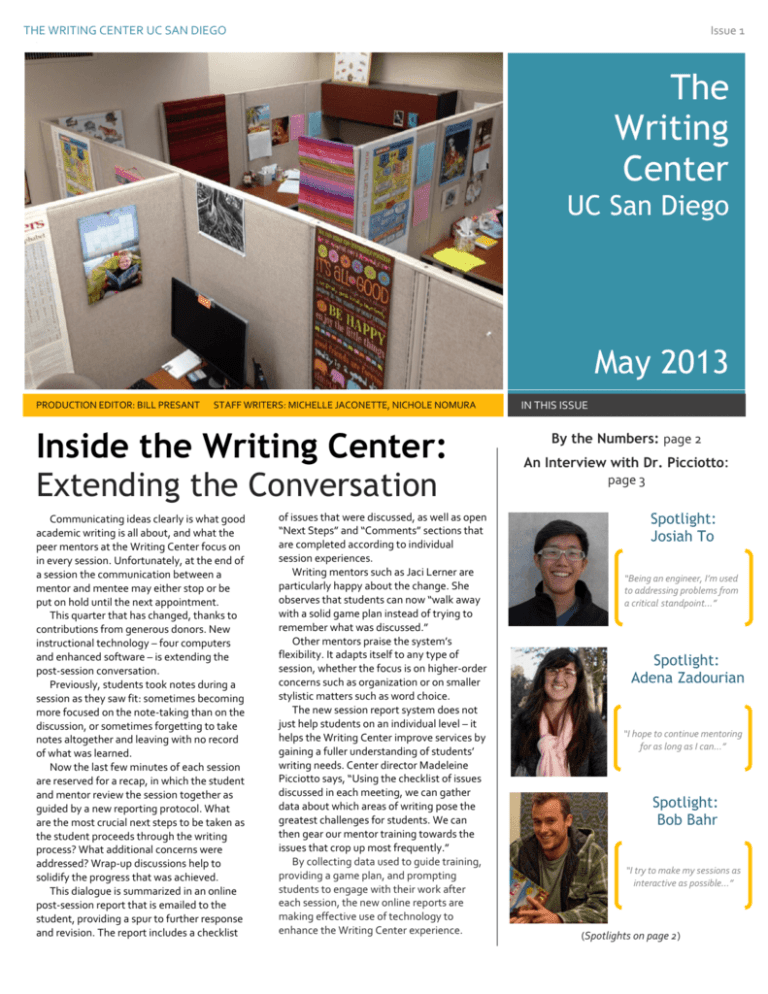
THE WRITING CENTER UC SAN DIEGO Issue 1 1 The Writing Center UC San Diego May 2013 PRODUCTION EDITOR: BILL PRESANT STAFF WRITERS: MICHELLE JACONETTE, NICHOLE NOMURA Inside the Writing Center: Extending the Conversation Communicating ideas clearly is what good academic writing is all about, and what the peer mentors at the Writing Center focus on in every session. Unfortunately, at the end of a session the communication between a mentor and mentee may either stop or be put on hold until the next appointment. This quarter that has changed, thanks to contributions from generous donors. New instructional technology – four computers and enhanced software – is extending the post-session conversation. Previously, students took notes during a session as they saw fit: sometimes becoming more focused on the note-taking than on the discussion, or sometimes forgetting to take notes altogether and leaving with no record of what was learned. Now the last few minutes of each session are reserved for a recap, in which the student and mentor review the session together as guided by a new reporting protocol. What are the most crucial next steps to be taken as the student proceeds through the writing process? What additional concerns were addressed? Wrap-up discussions help to solidify the progress that was achieved. This dialogue is summarized in an online post-session report that is emailed to the student, providing a spur to further response and revision. The report includes a checklist by [Article Author] of issues that were discussed, as well as open “Next Steps” and “Comments” sections that are completed according to individual session experiences. Writing mentors such as Jaci Lerner are particularly happy about the change. She observes that students can now “walk away with a solid game plan instead of trying to remember what was discussed.” Other mentors praise the system’s flexibility. It adapts itself to any type of session, whether the focus is on higher-order concerns such as organization or on smaller stylistic matters such as word choice. The new session report system does not just help students on an individual level – it helps the Writing Center improve services by gaining a fuller understanding of students’ writing needs. Center director Madeleine Picciotto says, “Using the checklist of issues discussed in each meeting, we can gather data about which areas of writing pose the greatest challenges for students. We can then gear our mentor training towards the issues that crop up most frequently.” By collecting data used to guide training, providing a game plan, and prompting students to engage with their work after each session, the new online reports are making effective use of technology to enhance the Writing Center experience. IN THIS ISSUE By the Numbers: page 2 An Interview with Dr. Picciotto: page 3 Spotlight: Josiah To “Being an engineer, I’m used to addressing problems from a critical standpoint…” Spotlight: Adena Zadourian “I hope to continue mentoring for as long as I can…” Spotlight: Bob Bahr “I try to make my sessions as interactive as possible…” (Spotlights on page 2) THE WRITING CENTER UC SAN DIEGO | Issue 1 2 Mentor Spotlights The 27 peer mentors who currently work at the Writing Center represent a wide range of backgrounds, interests, and experiences. Get to know some of our talented staff! Josiah To Bob Bahr Adena Zadourian Year: Senior College: Earl Warren Major: Bioengineering/Pre-Med Favorite Hobby: Playing guitar Year: Senior College: Eleanor Roosevelt Major: Political Science Favorite Hobby: Reading Year: Sophomore College: Thurgood Marshall Major: Physiology/Neuroscience Favorite Hobby: Photography As a writing mentor, I strive to help the students I work with think critically about their writing. I ask a lot of questions and try to prompt students to find the answers for themselves, instead of spoon-feeding them the information. I find that this helps students to truly grasp what they’re learning, and to develop the ability to apply it to future writing assignments. It is my aim to give each student the tools he or she needs to feel confident in all areas of writing. Being an engineer, I’m used to addressing problems from a critical standpoint, and I encourage students to think about how to approach a concern they have before actually tackling it. This allows them to step back and examine exactly what they are being asked to do and to conceptualize the task at hand. It’s a skill they can use to problem-solve in any type of situation, not just when writing. Working at the Writing Center has helped to balance my dense engineering classes. I love the challenge of analyzing a writing prompt and helping a student achieve that “light bulb” moment. I’ve also learned how to better articulate my ideas and communicate with others. I know that improving my interpersonal skills will help me when I’m working with patients as a physician, and I would love to pursue some kind of tutoring or mentoring in the future. My interesting in tutoring began last year while studying abroad in Thailand. During my time in Bangkok I was given the opportunity to teach English at a K-8 school in a rural area just outside the city. I hadn’t been planning on teaching while I was abroad, but the opportunity arose and I thought it would be a great experience. The students were eager and excited to learn, and as a teacher I found the job to be extremely rewarding. After returning to UCSD I began working as a peer writing mentor at the Writing Center, and have applied the teaching skills I learned in Thailand to my mentoring here. I try to make my sessions as interactive as possible by encouraging students to ask a lot of questions. I also try to make them feel comfortable and confident about writing by giving them positive reinforcement and constructive criticism. Being a writing mentor has helped me to improve my own writing. I find that I’m much more thoughtful and careful about what I write. I’ve learned to take my time and consider each sentence or word that I choose to put down on paper. I’ve also grown much more patient with myself and others. I hope to continue tutoring or teaching English either in the U.S. or abroad. I began mentoring my fellow students in math and science during high school, which proved to be great practice for working at the Writing Center. When I work with students, first and foremost I try to establish a friendly and comfortable atmosphere. I always greet my students, ask them how they’re doing, and try to discover a common interest we might share in order to lighten the mood and take some of the stress or pressure off the mentoring session. Next, I let the student talk to me about the piece they’re working on. Thanks to mentoring, I’ve learned how to truly listen to other people. I understand how important it is to get to the root of the problem by addressing the needs of the student as well as the needs of the paper, and the only way to do this is by actively listening to the student. One of the most rewarding parts of this job is watching a struggling student finally make a connection and grasp what I have been trying to teach them. Since I started working as a writing mentor, I have seen a great improvement in my own writing abilities as well as in my patience and competence in dealing with people from a variety of backgrounds. I hope to continue mentoring for as long as I can, because I love helping other people and that is something I don’t want to give up. The Writing Center by the Numbers As of May 15, the Writing Center has served 1,836 students in thousands of one-on-one sessions and 76 group workshop meetings over the course of the 2012-2013 academic year. Students have sought assistance for papers from 204 different UCSD courses as well as for out-of-class writing tasks such as application essays and cover letters. Approximately 44% of students have been “repeat customers,” returning for two or more visits. Students indicate a high level of satisfaction with center services, giving the peer mentors an impressive average rating of 4.7 out of 5 on session evaluation forms. 4.7/5.0 average mentor rating 44% of students return 1,836 students THE WRITING CENTER UC SAN DIEGO | Issue 1 Students Speak Out “I started to get help from the Writing Center last quarter. I make an appointment with the same mentor almost every week, and she has helped me so much on my papers. I wish I had known about the Writing Center earlier in my freshman year.” -- Yulin Liu, Psychology Major Thurgood Marshall College “I really felt that the mentors in the center were able to take a different look at my paper and give me insights that I would not have reached on my own. They are also very helpful in teaching the skills to write a paper, so that I now feel I need less help and am able to construct a solid paper alone.” -- Katie Boykin, Language Studies Major Eleanor Roosevelt College “The UCSD Writing Center is a wonderful resource for students to receive help with their writing! Not only can you be assisted by a knowledgeable individual; they also send you follow-up notes to confirm that you can improve your paper to the best of your ability.” -- Lavinia Osilesi, Political Science Major Earl Warren College Find out more about the Writing Center at UC San Diego: writingcenter.ucsd.edu facebook.com/ucsdwritingcenter twitter.com/writeUCSD writingcenter@ucsd.edu Mentors take a break in the Writing Center lounge. 3 The Future of the Writing Center: An Interview with Director Madeleine Picciotto Q: What are your thoughts as you come to the end of the Writing Center’s first full year of operation? A: The Writing Center has been extremely successful in its first year, and we’re hoping to build on this success in the years to come. Many students have visited us for assistance on papers from the college writing programs, and we look forward to having them return as they go on to write in other classes. We’d especially like to see more students coming to us for help with upper-division courses. To this end, we’re working to build stronger collaborative relationships with professors from a variety of departments. Q: What are you doing to improve the center’s ability to serve student writers across the disciplines? A: As more students from a wider range of classes use our services, our peer writing mentors will need enhanced training in order to be prepared to handle a variety of paper genres and expectations. The training process is ongoing, as we continually strive to improve and expand our tutorial abilities. Q: Will the workshop offerings be broadened, as well? A: We’ll be introducing new workshops addressing writing for the sciences and social sciences – for example, how to write abstracts and literature reviews. We want to do more to help students with lab reports and other forms of scientific writing. Q: Are there other changes and improvements that you have in mind? A: We’d like to make better use of technology. We’re currently experimenting with an online note-taking procedure that enables us to email students helpful reports of their one-on-one sessions. This quarter we’ve also been working on digitizing all of our paper materials, to improve our own access to them and to enable electronic distribution to the students who use our services. We hope to explore more efficient record-keeping and data-collection methods, too, to make operations at the Writing Center as streamlined as possible. Q: Have you thought about technological approaches for outreach and publicity? A: We’re making an effort to increase our social media presence. We’d like to use our current Facebook page and Twitter account for broader outreach and to disseminate information about our programs and services. Q: How would you sum up the Writing Center’s progress so far? A: Thanks to the hard work of our dedicated peer mentors, the Writing Center is off to a great start, and we look forward to continuing to serve the writing needs of UCSD undergraduates. Group Workshops In a university environment with thousands of undergraduates and many large lecture courses, it can sometimes be hard for students to get the help they need to write well. The individual assistance provided by the Writing Center’s peer mentors is one avenue for addressing this problem. Another is the center’s workshop series, where students facing common challenges in their writing come together for presentations by Writing Center Director Madeleine Picciotto. A wide range of workshops is offered each quarter addressing a variety of writing-related topics, often focusing on specific tasks or assignments (e.g. formulating a thesis, developing a research proposal, preparing an annotated bibliography, or writing an application essay). Workshop enrollment ranges from 5 to 28 students; participation and questions are always encouraged. Students who have attended Writing Center workshops give very positive reviews, and workshop attendance continues to grow. One student praises the “passionate” and “energetic” delivery of workshop content, and adds that the workshops are “a memorable and especially helpful resource for all students.” Dr. Picciotto is always willing to develop new workshops or to offer additional sessions of existing workshops at the request of individual programs, departments, student groups, or faculty members. Interested parties should contact her via email at mpicciotto@ucsd.edu.

